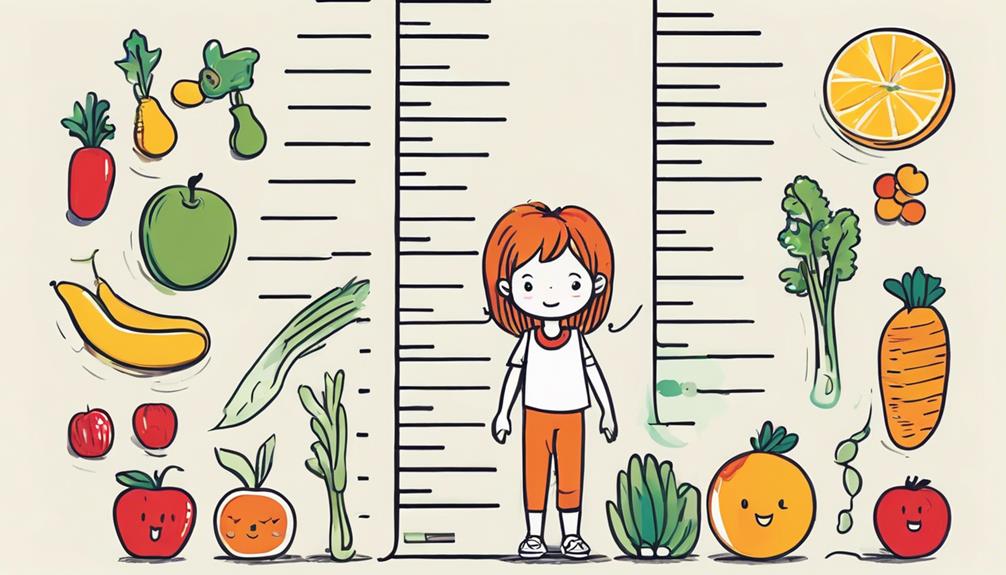Nutrition serves as the cornerstone for human growth and development, particularly in the formative years. The intricate relationship between what we consume and how our bodies evolve is a fascinating subject ripe for exploration. From the impact on physical stature to the nuances of cognitive prowess, the influence of nutrition is a multifaceted lens through which we can understand our own potential. As we delve deeper into the realms of macronutrients, micronutrients, and their interplay with genetics, the intricate dance of growth gradually unfolds, revealing the profound significance of our dietary choices.
Key Takeaways
- Proper nutrition supports bone, muscle, and cognitive development in children.
- Essential nutrients like protein, calcium, and vitamins are vital for healthy growth.
- Inadequate nutrition can lead to stunted growth, delayed maturation, and cognitive impairments.
- Caretakers play a crucial role in shaping children's nutrition for optimal growth and development.
Impact of Nutrition on Physical Growth

Proper nutrition plays a critical role in supporting physical growth by supplying essential nutrients necessary for bone development and muscle function in children. A child's growth and maturation are heavily influenced by the quality of their diet. Essential nutrients such as protein, calcium, and vitamin D are vital for optimal physical growth and bone strength. A balanced diet that is rich in vitamins and minerals is crucial for ensuring healthy and steady physical growth throughout childhood.
Inadequate nutrition can have detrimental effects, leading to stunted growth and delayed maturation in children. Malnutrition during critical growth phases can result in long-term consequences on a child's height and overall physical development. It is imperative to provide children with a diet that encompasses all the necessary nutrients to support their physical growth adequately. By emphasizing the importance of a balanced diet rich in essential nutrients, parents and caregivers can significantly impact and promote healthy physical growth in children.
Nutritional Influence on Cognitive Development
Nutrition's critical role extends beyond physical growth, as it significantly influences cognitive development in preschool-age children by enhancing learning abilities and memory retention. Proper nutrition is vital for optimal cognitive function, with nutrient intake playing a key role in supporting brain development during this crucial developmental stage. Studies have shown that nutritional interventions not only improve attention span but also contribute to overall cognitive growth in young children. Balanced and healthy eating habits are essential to ensure that preschoolers receive the necessary nutrients for brain growth, which ultimately impacts their cognitive abilities from early childhood through adolescence. Adequate nutrition sets the foundation for enhanced cognitive development, positively influencing academic performance and social skills. Therefore, emphasizing the importance of a nutrient-rich diet is paramount in promoting healthy cognitive development in preschool-age children. By prioritizing nutritional needs, caregivers and educators can help maximize the cognitive potential of young learners.
Benefits of Good Nutrition in Childhood

The benefits of good nutrition in childhood encompass a wide range of physiological and cognitive advantages that contribute significantly to overall health and well-being. Proper nutrition during childhood is essential for healthy development, aiding in the growth of bones, muscles, teeth, skin, and eye health. It also plays a crucial role in cognitive functions such as alertness, focus, memory, academic success, and improved test scores. By maintaining a balanced diet, children can reduce the risk of illnesses and achieve a healthy body weight, which is vital for overall well-being. Moreover, nutritious eating habits positively impact cognitive development, academic performance, and speech and language skills, enhancing the learning process. Adequate intake of essential foods supports children's growth and development, laying a solid foundation for their future health.
| Categories | Benefits |
|---|---|
| Physiological | Strengthen bones, muscles, teeth, and skin |
| Cognitive | Enhance alertness, focus, memory, academics |
| Health | Reduce illness risk, maintain healthy weight |
Consequences of Poor Nutrition on Growth
Insufficient dietary intake of essential nutrients can have detrimental effects on the growth and development of children, leading to various consequences on physical and physiological aspects. Nutritional deficiencies resulting from poor diet choices can manifest as growth retardation and stunted physical development in children. Inadequate nutrient intake may contribute to decreased bone density and muscle mass, ultimately affecting overall growth patterns. Children experiencing poor nutrition are at risk of delayed puberty and hormonal imbalances, which can disrupt normal growth spurts during adolescence. The lack of essential vitamins and minerals in the diet can impede the body's ability to grow and develop properly, further exacerbating growth-related issues. Chronic malnutrition poses a significant threat, potentially causing long-term growth complications like permanent height deficits and developmental delays. Addressing these concerns through proper nutrition is crucial in ensuring optimal growth and development in children, emphasizing the importance of a well-balanced diet rich in essential nutrients.
Role of Caretakers in Child Nutrition

Caretakers hold a pivotal role in shaping a child's nutrition through their feeding responsibilities. Selecting nutrient-rich meal choices and closely monitoring a child's food intake are crucial aspects of this responsibility. By focusing on these key points, caretakers can help establish healthy eating habits early on in a child's life.
Caretaker's Feeding Responsibilities
In shaping children's dietary choices, caregivers play a crucial role in fostering healthy eating habits and nutritional awareness. Caretakers should develop an awareness of food marketing techniques to make informed decisions about children's nutrition. Introducing vegetables into meals slowly can help children adapt to new flavors and textures. Limiting sweet and salty snacks can promote healthy eating habits and reduce the intake of empty calories. Scheduling regular meal and snack times throughout the day can establish a routine that supports healthy eating behaviors. Family meals contribute to the development of social skills and emotional well-being in children. By fulfilling their feeding responsibilities diligently, caretakers can guide children towards a balanced diet and a lifelong appreciation for nutritious foods.
Nutrient-Rich Meal Choices
To support children's optimal growth and development, it is pivotal for caregivers to prioritize nutrient-rich meal choices that align with recommended dietary guidelines. Introducing vegetables into meals gradually and limiting sweet and salty snacks can foster healthy eating habits in children. Establishing regular meal and snack times throughout the day helps in cultivating positive eating patterns. Caretakers should be mindful of food marketing techniques to ensure a variety of nutritious food options are available to children. Additionally, engaging in family meals not only provides an opportunity for shared experiences but also contributes to the development of social skills and emotional well-being in children. By focusing on nutrient-rich meal choices and promoting healthy eating habits, caretakers play a crucial role in shaping the overall well-being of children.
Monitoring Child's Intake
A critical aspect of fostering children's healthy growth and development involves meticulously overseeing their dietary intake to ensure they receive essential nutrients for optimal well-being. Caretakers play a crucial role in monitoring a child's food intake, guiding them towards healthy food choices and balanced eating habits. This oversight includes offering a variety of nutritious options, establishing regular meal and snack times, and gradually introducing vegetables while limiting unhealthy snacks. By maintaining consistent energy intake and promoting family meals, children not only receive adequate nutrition but also benefit socially and emotionally. Through these efforts, caretakers contribute significantly to the child's healthy growth and overall well-being.
Early Childhood Nutrition Essentials

During the critical phase of early childhood, nutrition plays a pivotal role in shaping optimal growth and development in preschool-aged children. Proper nutrition is essential during this early stage, as it significantly influences growth patterns, cognitive abilities, and overall health. Preschoolers experience rapid growth, with an average increase in height of 6-9 inches between the ages of 2-5. A balanced diet that includes nutrient-dense foods like fruits, vegetables, whole grains, and fish is crucial for supporting healthy growth and brain development. Nutrient deficiencies, often linked to poor eating habits such as skipping meals or consuming high levels of sugar and fat, can hinder a child's growth and leave them susceptible to diseases. Inadequate intake of fruits and vegetables not only impacts physical growth but also affects cognitive development. Therefore, ensuring early childhood nutrition includes a variety of healthy foods is vital for preventing weight gain issues and promoting optimal growth in preschool-aged children.
Factors Affecting Growth Through Nutrition
Proper nutrition plays a critical role in influencing the growth of individuals by providing essential nutrients necessary for bone development, muscle growth, and overall physical health. Factors affecting growth through nutrition include:
- Nutritional Intervention: Interventions addressing specific nutritional needs during early childhood development are crucial for supporting optimal growth potential and preventing developmental delays.
- Physical Development Monitoring: Pediatric growth charts are valuable tools for tracking growth patterns and identifying any signs of nutritional deficiencies that may impede proper physical development.
- Balanced Nutrition Impact: A diet rich in essential nutrients such as protein, calcium, and vitamins supports brain development and ensures children reach their full genetic growth potential, reducing the risk of growth-related issues.
Promoting Optimal Growth With Nutrition

Nutrition plays a pivotal role in fostering optimal growth in children by providing essential nutrients crucial for their physical development and overall well-being. Adequate nutrition is essential for a child's growth as it supports significant brain development and is required for overall cognitive function. Poor eating habits can lead to nutritional deficiencies, resulting in stunted growth and cognitive impairments. Nutrients such as protein, iron, calcium, and vitamins are vital for bone, muscle, and cognitive growth during crucial developmental stages. Encouraging healthy eating habits and incorporating balanced meals can help prevent these issues and ensure that children reach their full growth potential. Additionally, engaging in physical activity along with proper nutrition can further enhance a child's growth and development. By prioritizing nutrient-dense foods and instilling healthy eating habits early on, caregivers can support children in thriving both physically and mentally.
Frequently Asked Questions
Why Is Nutrition Important in Human Growth?
Nutrition is pivotal in human growth due to its profound impact on various physiological processes. Nutrient absorption facilitates cellular function, supporting bone development, muscle growth, and organ health. Hormonal balance, brain function, and energy levels are influenced by nutrition, affecting metabolic rate and immune system efficiency. Moreover, nutrition plays a critical role in cell division, crucial for growth. In essence, proper nutrition is indispensable for fostering optimal growth and overall well-being.
What Nutrition Is Responsible for Growth?
Protein intake, vitamin D, calcium sources, iron levels, omega 3 fatty acids, zinc importance, fiber benefits, carbohydrate role, micronutrient balance, and growth hormones all play vital roles in promoting growth. Protein supports tissue repair and muscle development, vitamin D aids calcium absorption for bone formation, while iron, zinc, and other nutrients contribute to overall development. Maintaining a balanced intake of these nutrients is crucial for optimal growth and development.
How Does Eating Healthy Affect Our Stages of Growth?
Eating healthy profoundly impacts our stages of growth by providing essential nutrients that support brain development, muscle growth, bone density, hormone regulation, immune system function, energy levels, cognitive function, cell division, metabolism rate, and height increase. Nutrient-dense foods play a critical role in ensuring optimal growth and development by fueling various physiological processes necessary for growth and overall well-being during childhood and adolescence.
What Is the Impact of Good Nutrition on the Growth of the Child?
Good nutrition profoundly impacts a child's growth by supporting essential processes like brain development, muscle growth, bone health, height increase, hormone regulation, immune system function, energy levels, cognitive function, metabolic rate, and cell division. Adequate intake of nutrients like proteins, vitamins, and minerals is crucial for optimal growth and development. Consistent access to nutrient-dense foods is key to ensuring children reach their growth potential and developmental milestones.
Conclusion
In conclusion, nutrition plays a crucial role in influencing physical growth and cognitive development in children. A study by the World Health Organization found that malnutrition contributes to nearly 45% of all child deaths globally. Therefore, ensuring proper nutrition through healthy eating habits is essential for optimal growth and development in young individuals. Caretakers must prioritize providing nutrient-dense foods to support children's overall well-being and future success.
